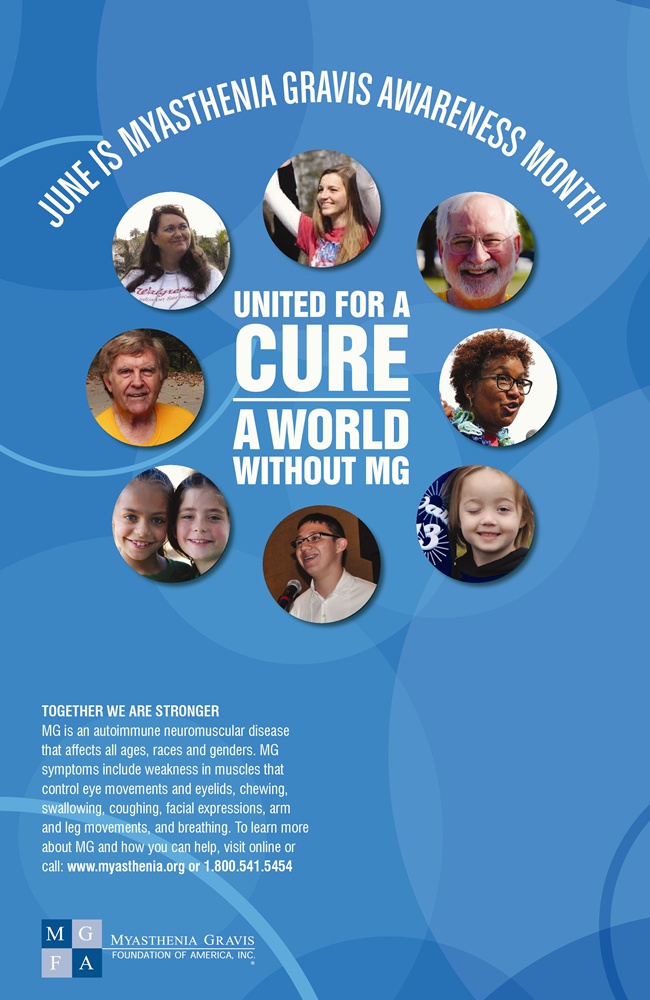June is Myasthenia Gravis Awareness Month
 This June marks the fourteenth annual “Myasthenia Gravis Awareness Month,” a nationwide movement created by the Myasthenia Gravis Foundation of America, Inc. (MGFA) to raise awareness of the often misunderstood and under-diagnosed disease, Myasthenia Gravis (MG). MG strikes people of all ages, races, and genders and, while treatments are available to improve muscle strength, there is no known cure.
This June marks the fourteenth annual “Myasthenia Gravis Awareness Month,” a nationwide movement created by the Myasthenia Gravis Foundation of America, Inc. (MGFA) to raise awareness of the often misunderstood and under-diagnosed disease, Myasthenia Gravis (MG). MG strikes people of all ages, races, and genders and, while treatments are available to improve muscle strength, there is no known cure.
During the month of June, MGFA’s official “MG Awareness Month,” the national office, as well as chapters and individuals throughout the country, is involved in a variety of activities to promote awareness. These activities include obtaining proclamations from local and state officials, providing information about MG to the media, holding MG awareness events, disseminating information via social networks, and distributing MGFA’s “United For A Cure. A World Without MG” June Awareness Month poster. Several states and cities, including New York, Massachusetts, Nevada and most recently Connecticut, have issued proclamations, recognizing the month of June as Myasthenia Gravis Awareness Month!
What is Myasthenia Gravis?
Myasthenia gravis (MG) literally means “grave muscle weakness.” It is a serious, potentially life threatening, neuromuscular, autoimmune disease which causes severe weakness in the voluntary muscles of the body. MG strikes both children and adults, and can affect a person’s ability to see, speak, walk, smile, eat–and at its worst, even draw a breath. MG saps strength, can erode abilities and hopes, halt a career, and unravel the fabric of families.
Symptoms of MG can include:
- A drooping eyelid
- Blurred or double vision
- Slurred speech
- Difficulty chewing and swallowing
- Weakness in the arms and legs
- Chronic muscle fatigue
- Difficulty breathing
What are the treatments for MG?
There is no known cure for MG, but there are effective treatments available. Common treatments include medications, thymectomy (surgical removal of the thymus gland) and plasmapheresis (plasma exchange). Spontaneous improvement and even remission may occur without specific therapy. Medications are most frequently used in treatment.
What is the prognosis for those with MG?
The current treatments for MG are sufficiently effective that the outlook for most patients is bright. Although the treatments will not cure MG, most patients will have improvement in their muscle strength. In some cases, MG may go into remission, during which no treatment is necessary. There is much that can be done, but still much to understand. New drugs to improve treatments are needed. Research plays an important role in finding new answers and treatments for MG.
For more information about Myasthenia Gravis, visit the MGFA website.
Why Should You Wear a Medical ID if You Have MG?
As myasthenia gravis progresses, sudden flare-ups can occur unexpectedly and often at awkward times. Wearing a medical ID bracelet or necklace can be a great benefit in explaining your situation to those around you and perhaps even save your life should you have a myasthenic crisis. There are certain drugs that patients with MG should avoid or only use with caution, such as neuromuscular relaxants which worsen the condition. In an emergency situation, first responders need to know that you have have MG in order to properly treat you and avoid the possibility of harming you further. Knowing that you are myasthenic at the onset will allow the emergency team to order the right tests and medication. Even if you are unable to talk at the time, wearing a medical ID can contain identify you as having myasthenis gravis and the medication you’re taking. The emergency team will be able to act swiftly and give you the proper treatment.




